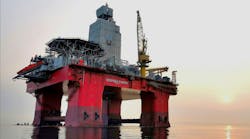Uchenna Izundu
International Editor
LONDON, Mar. 13 -- RWE Dea AG is planning seismic surveys in the German state of Schleswig-Holstein to assess possible storage sites for carbon dioxide.
Researchers from the University of Kiel and the Leibniz Institute of Marine Sciences IFM-GEOMAR call the North German region a prime carbon storage target because of saltwater-bearing rock formations and lowland plains.
RWE Dea filed an application with the State Department for Mining, Energy, and Geology (LBEG) to explore three regions in Schleswig-Holstein: North Frisia, in East Holstein and offshore under the North Sea, outside the 12-mile zone. The saline formations are at least 1,000 m deep with impermeable rock.
Minister for Science Dietrich Austermann said, "Compared with the other states, Schleswig-Holstein offers more favorable conditions and could be considered an ideal location."
Georg Schöning, chief executive of RWE Dea, said carbon capture and storage (CCS) is a bridging technology to climate protection. RWE hopes to analyze seismic survey results by yearend 2009 and drill a well in 2010.
"If all the geological pre-conditions are found to be as required, the end of the exploration phase could lead to the construction and operation of a CO2 storage facility in Schleswig-Holstein," RWE Dea said.
Such a facility could cost 60 million euro to build with estimated annual operating costs of 4 million euro.
CCS technology is expected to help reduce carbon emissions from coal-fired power stations in Schleswig-Holstein. New coal power plants in Brunsbüttel, Kiel and Hamburg are under consideration. Austermann said fossil fuels would remain an important part of Germany's energy mix during a transitional period from nuclear power.
Contact Uchenna Izundu at [email protected].
